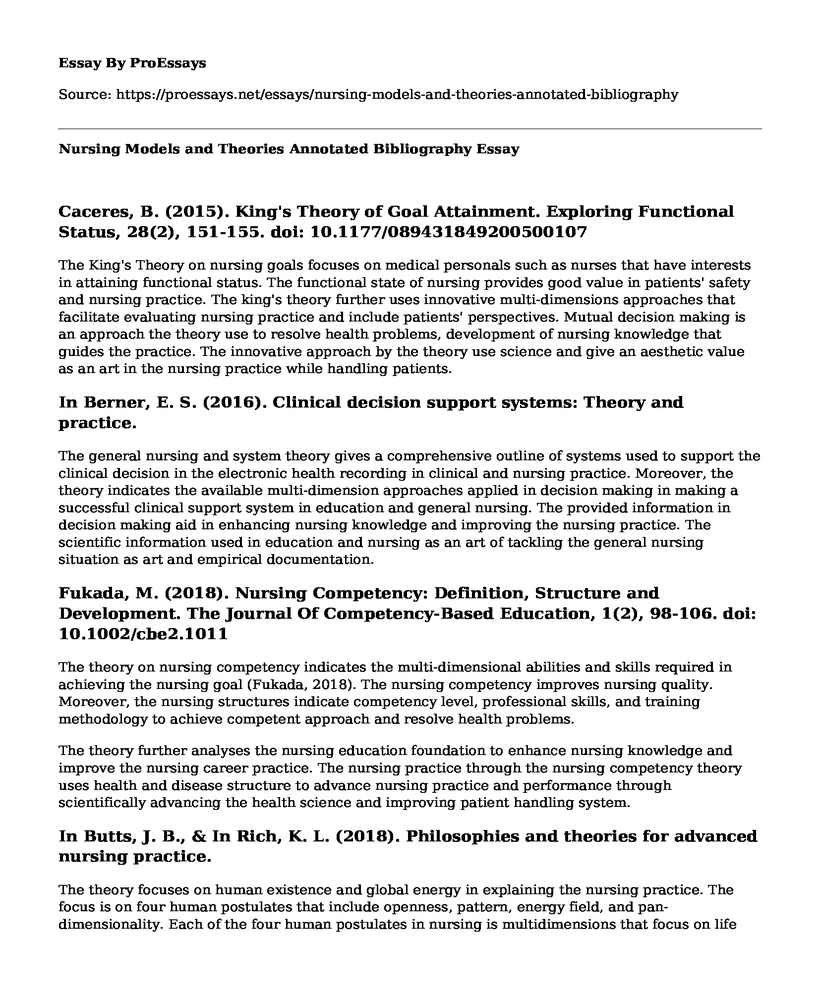Caceres, B. (2015). King's Theory of Goal Attainment. Exploring Functional Status, 28(2), 151-155. doi: 10.1177/089431849200500107
The King's Theory on nursing goals focuses on medical personals such as nurses that have interests in attaining functional status. The functional state of nursing provides good value in patients' safety and nursing practice. The king's theory further uses innovative multi-dimensions approaches that facilitate evaluating nursing practice and include patients' perspectives. Mutual decision making is an approach the theory use to resolve health problems, development of nursing knowledge that guides the practice. The innovative approach by the theory use science and give an aesthetic value as an art in the nursing practice while handling patients.
In Berner, E. S. (2016). Clinical decision support systems: Theory and practice.
The general nursing and system theory gives a comprehensive outline of systems used to support the clinical decision in the electronic health recording in clinical and nursing practice. Moreover, the theory indicates the available multi-dimension approaches applied in decision making in making a successful clinical support system in education and general nursing. The provided information in decision making aid in enhancing nursing knowledge and improving the nursing practice. The scientific information used in education and nursing as an art of tackling the general nursing situation as art and empirical documentation.
Fukada, M. (2018). Nursing Competency: Definition, Structure and Development. The Journal Of Competency-Based Education, 1(2), 98-106. doi: 10.1002/cbe2.1011
The theory on nursing competency indicates the multi-dimensional abilities and skills required in achieving the nursing goal (Fukada, 2018). The nursing competency improves nursing quality. Moreover, the nursing structures indicate competency level, professional skills, and training methodology to achieve competent approach and resolve health problems.
The theory further analyses the nursing education foundation to enhance nursing knowledge and improve the nursing career practice. The nursing practice through the nursing competency theory uses health and disease structure to advance nursing practice and performance through scientifically advancing the health science and improving patient handling system.
In Butts, J. B., & In Rich, K. L. (2018). Philosophies and theories for advanced nursing practice.
The theory focuses on human existence and global energy in explaining the nursing practice. The focus is on four human postulates that include openness, pattern, energy field, and pan-dimensionality. Each of the four human postulates in nursing is multidimensions that focus on life fundamentals of energy flow in the energy field and the diverse changing human science. The four approaches assist in resolving the changing health problems in the nursing career.
The theory further uses continuous change in the human environment through resonance, helices, and integrity approaches to acquire more knowledge in nursing practice. The theory can apply science through the scientific study of the evolving health challenges and aesthetically through handling people and their environment.
Boykin, A., & Schoenhofer, S. O. B. (2014). Nursing as caring: A model for transforming practice. United States: A. Boykin, S.O. Schoenhofer.
The nursing as caring theory features in community health facility that engages nurses and members with an aim to test the right model of nursing practice, care model, and patients satisfaction. The theory indicates results from the engaged members through new care model that changed the healthcare workplace setting to resolve the health and medical problems.
The new approach provides more knowledge regarding health care towards patients. Similarly, the care models and strategies implements provided a caring aesthetic system for the client and scientific information to guide nursing values.
Alligood, M. R. (2014). Nursing Cultural theory: Utilization & application.
The nursing, cultural theory highlights that nursing application, philosophies, and culture at the workplace. The theory similarly uses the past to develop the right models to guide the nursing practice in the future through nature of knowledge applied in nursing practice.
Moreover, the study uses different models such as normal science, Watson's philosophy, and Johnson behavioral system and models guide the nursing practice. The applied models that contribute to an artistic culture in improving the culture of handling patients, advance knowledge in aesthetic nature of handling patients, and enhancing scientific nursing knowledge.
Swezey, N. (2017). A Nurse's Perspective on Janice Morse's Praxis Theory of Suffering - CUNY Academic Commons. Retrieved from https://commons.gc.cuny.edu/papers/60044/
The Praxis suffering theory focus to guide the nursing practice through facing healthcare illness challenges, and patients' experiences. Similarly, the theory further use different models such as cultural competence models, evaluating nursing contexts, experts, and research-based evidence in resolving healthcare sufferings.
The expertise approach responds to illness experiences such as hospice and trauma. Moreover, the expertise provides in this theory enhance nursing knowledge and shape advancing nursing practices through developed patient handling techniques, scientific handling of different illnesses, and aesthetically relate with all ill patients.
Cite this page
Nursing Models and Theories Annotated Bibliography. (2022, Jun 17). Retrieved from https://proessays.net/essays/nursing-models-and-theories-annotated-bibliography
If you are the original author of this essay and no longer wish to have it published on the ProEssays website, please click below to request its removal:
- How Alternative Forms of Drugs Can Be Considered a Viable Alternative to Conventional Medicine?
- Strategic Issues Facing Health Care Organizations Paper Example
- Ciprofloxacin in Children Paper Example
- Discrimination Against People With HIV/AIDS Essay Example
- Essay Example on Pandemic or Epidemic: The World's Major Disease Issues
- Forensic Nursing: A Creative & Developing Nursing Specialty - Essay Sample
- Report Sample on Effects of Coronavirus on Pets







